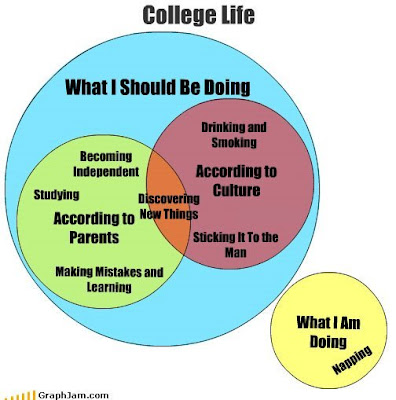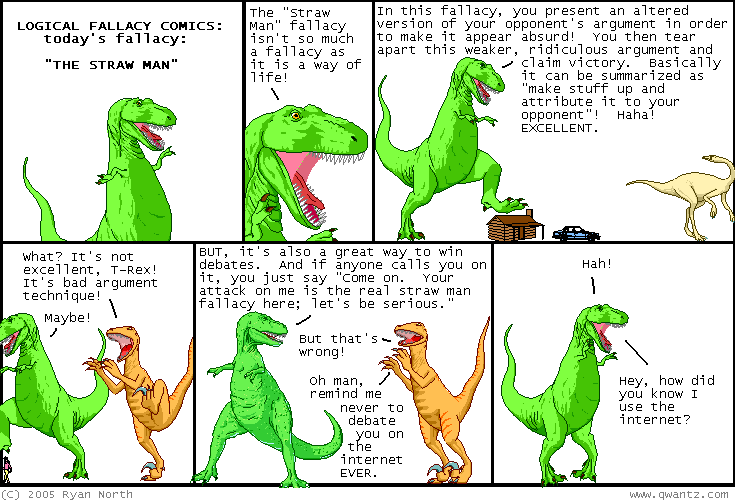The Logic of Everyday Reasoning
Rowan University
Philosophy 09110
Spring 2012
Section 01: Tuesdays and Thursdays, 8:00 – 9:15 a.m. in Savitz Hall, Room 217
Section 04: Tuesdays and Thursdays, 9:25 – 10:40 a.m. in Rowan Hall, Room 102 Instructor: Sean Landis
Email:
landis@rowan.edu
Phone: 609-980-8367
Course Website:
http://2012rowanlogic.blogspot.com
Office Hours: by appointment
Required Text
THiNK: Critical Thinking and Logic Skills for Everyday Life, 2nd edition, by Judith Boss
We are presented with arguments in support of all sorts of claims all the time, on topics as serious as abortion or the death penalty and as trivial as who the Phillies best player is or whether Conan is funnier than Leno. How can we tell good arguments from bad ones?
This course focuses on understanding and evaluating arguments. We’ll first learn how to identify the components and structures of arguments. We’ll then learn how to pick apart the bad reasoning found in some arguments by going over logical fallacies, which are the different ways an argument can go wrong. We’ll also discuss the limitations of our own reasoning abilities and the natural biases that throw us off.
Armed with these evaluative tools, we’ll then explore our arguments for what we believe, and revise or strengthen them based on proper reasoning. The course’s main goal is to develop a respect for arguments as an important, if not the most important, tool of inquiry and decision-making. Examining the logical evidence in support of a claim or decision is a crucial component of figuring out the truth and gaining a deep understanding of complex issues.
Assignments
Each assignment is created carefully, and designed to both measure and improve upon specific skills that students are expected to develop throughout the semester. I try to explicitly point out the educational importance of each assignment (both below and when I assign it), but if an assignment’s value is ever unclear, let me know! I value student feedback. Sometimes complacency makes me continue using an assignment that isn’t very helpful, or sometimes I haven’t explained an assignment clarly enough.
Midterm and Final Exams: Exams are a chance to demonstrate your understanding of a wide variety of topics and skills that we’ll study throughout the semester. To this end, there will be a variety of question types on the exams. The midterm tests everything covered during the first half of the course, and will last the full period (75 minutes) on the scheduled day. The final exam is cumulative—that is, it tests everything covered throughout the whole course. The final will also last about 75 minutes, and be held during finals week.
Quizzes: Unlike the exams, quizzes will not be cumulative. Quiz #1 will test you on everything covered during the first 4 weeks of class, and quiz #2 will test you on the material we cover after the midterm. Quizzes will last 25 minutes, and be held at the beginning of the period on the scheduled day.
Short Paper: There will be a short paper (400-800 words) on understanding and evaluating an argument from a newspaper or magazine article. Due toward the end of the semester, this assignment provides you with an opportunity to demonstrate whether you have developed two of the most primary skills we’re learning this semester: the ability to understand an argument, and the ability to evaluate an argument’s logical quality.
Group Presentation: This will be a group project presented in front of the class in the middle of the semester. Each group of 3-5 students will research two fallacies and present a 10- to 15-minute oral presentation on them to the rest of the class. Groups should focus on teaching these fallacies effectively. To this end, the main criteria groups shall be graded on are their understanding of the fallacies and their ability to effectively communicate their understanding to the rest of class.
Homework: Although I usually assign a lot of optional extra credit assignments throughout the semester, there will only be three graded homework assignments. These homework assignments will be similar to the various extra credit and in-class group work assignments we do. The graded homeworks, however, will usually come at the end of a particular section, after you have had a chance to try a variety of similar logical assignments in and out of class. The expectation, then, is not that you master every skill or concept as soon as it is introduced. Rather, you should expect to struggle on the informal and extra assignments, using them as important practice for improvement. Only after a lot of practice and effort do I expect you to perform well, and only then shall I grade your performance.
Fun Thursdays: There will be three in-class graded assignments scheduled on some Thursdays during the semester. These will be a chance to more casually discuss some issues more loosely related to the class, yet more closely connected to important practical concerns of our everyday lives.
Attendance/Participation: Most of this will be based on your attendance. If you’re there every class, you’ll get full credit for your attendance grade. In addition, informal group work can impact your grade. I value your attendance, and I expect you to show up each day. I also realize, though, that we sometimes need added motivation to attend each day, and I use this grade as a small carrot to motivate you.
Extra Credit: I like giving extra credit! I’ll be giving some official extra credit assignments throughout the semester. I’ll also be offering some extra credit points more informally during class time. Remind me about this if I slack off on dishing out extra credit points.
Midterm 150 points
Final 250 points
Quizzes (2) 75 points each (150 points total)
Group Presentation 150 points
Homework 90 points total
Short Paper 100 points
Fun Tuesdays 60 points total
Attendance/Participation 50 points
Grades
A = 934-1000 total points
A- = 900-933 total points
B+ = 867-899 total points
B = 834-866 total points
B- = 800-833 total points
C+ = 767-799 total points
C = 734-766 total points
C- = 700-733 total points
D+ = 667-699 total points
D = 634-666 total points
D- = 600-633 total points
F = below 600 total points
Classroom Policies
Academic Integrity: Cheating and plagiarism (using someone else’s words or ideas in a paper or assignment without giving credit to the source) will not be tolerated in the class. Students found guilty of either will definitely fail the exam or assignment on which they plagiarize—and possibly the entire class.
Excused Absences: Make-up exams, quizzes, in-class projects, and oral reports will only be rescheduled for any excused absences. Excused absences include religious observance, official college business, and illness or injury (with a doctor’s note). An unexcused absence on the day of any assignment or test can result in a zero on that assignment or test.
Disability Accommodations: If you have special requirements let me know as soon as possible so we can make all necessary arrangements.







